President Alberto Fernández called for dialogue with the opposition after Sunday's midterm elections, with projections showing his governing coalition has lost control of Congress.
Already in the minority in the lower house Chamber of Deputies, Fernández's Frente de Todos coalition looks set to drop from 41 to 35 seats in the 72-member Senate, based on projections with more than 98 percent of votes counted.
"If the numbers are confirmed, effectively we've lost the quorum in the Senate," a government source told the AFP news agency.
This would be the first time since Argentina's return to democracy in 1983 that Peronism – the leftist movement based on former president Juan Perón that now covers a broad spectrum of political leanings -–would not have a majority in the Senate.
According to a breakdown by the La Nación newspaper, the opposition Juntos por el Cambio coalition took 41.97 percent of the national vote (all votes cast), with the ruling Peronist coalition on 33.57 percent.
The opposition, which will now gain ground in both chambers of Congress, scored key victories in Buenos Aires City and the provinces of Buenos Aires, Córdoba, Mendoza and Santa Fe, regions that carry a lot of electoral weight. Juntos por el Cambio also emerged victorious in the provinces of Jujuy, La Pampa, Chubut, Corrientes, Entre Ríos, Misiones, San Luis and Santa Cruz.
Frente de Todos, which improved its performance notably from last September's primaries in Buenos Aires Province, only managed to turn around races in Chaco and Tierra del Fuego, regions that carry little electoral weight.
Ahead of the election there was widespread discontent over an economy hit hard by the Covid pandemic.
Fernández will now likely be forced to make concessions to the opposition during the last two years of his mandate in order to pass laws or make key appointments, including to the Judiciary. Congress will likely be extremely polarised, with little margin to either side's favour in both chambers.
"We need to prioritise national agreements if we want to resolve the challenges we face," said the Peronist leader in a speech, adding that he would approach opposition groups to try to find common ground on an agenda.
"An opposition that is responsible and open to dialogue is a patriotic opposition," he said, adding that he hoped for cooperation that would be "fruitful, for the general interests of the country."
Fernández "will have to negotiate law by law," said Raúl Aragon, political scientist at the National University of La Matanza.
He predicted the opposition would be open to talks though.
"It won't serve them to not engage in dialogue, and appear anti-democratic" before the presidential elections in 2023, Aragon said.
Nearly half the Chamber of Deputies seats were up for grabs, as well as a third of Senate seats in Sunday's vote.
Interior Minister Eduardo 'Wado' de Pedro said turnout in the compulsory election was between 71 and 72 percent.
IMF debt looms
Fernández had been on the defensive since his coalition suffered a bruising defeat in September's primaries, picking up just 33 percent of the vote compared to 37 percent for the main opposition group Juntos por el Cambio, led by Fernández's predecessor Mauricio Macri.
The country has been in recession since 2018, with GDP dropping 9.9 percent last year due to the coronavirus pandemic.
Argentina has one of the world's highest inflation rates, at 40 percent so far this year, and a poverty rate of 42 percent for a population of 45 million.
"I fear for the economy," pastry worker Oscar Navarro told AFP on Sunday, without revealing his vote. "Salaries are not sufficient. Whoever wins, it will take a long time for the country to recover."
The primaries setback unleashed a political crisis pitting Fernandez against his vice-president and coalition partner Cristina Fernández de Kirchner, who pressured her boss into a Cabinet reshuffle in the hopes of appeasing an increasingly frustrated electorate.
Fernández de Kirchner was not at the Frente de Todos bunker with party officials and supporters on Sunday night. The vice-president, who is recovering from an operation earlier this month, said she had been advised not to attend by doctors.
The government is also in the midst of a tricky renegotiation with the International Monetary Fund over the repayment of a US$44-billion debt, originally secured by the Macri government in 2018.
"In this new stage we will deepen our efforts to secure a sustainable deal with the IMF," said Fernández.
He said the country needed to get past the "uncertainties that come with unsustainable debt," while creating jobs and reducing inflation.
If Fernández does not manage to reach a new repayment schedule, Argentina will have to repay US$19 billion in 2022 and as much again in 2023.
Buenos Aires City Mayor Horacio Rodríguez Larreta, commenting on the results from the opposition's bunker in Costa Salguero, said that Juntos por el Cambio had "grown" and is "continuing to grow, thanks to unity and where he stressed: "We have grown and we have to continue growing, thanks to unity."
"I insist that we have to continue working against 'la grieta'," he declared, referencing Argentina's stark political polarisation.
'Difficult' two years ahead
Since the primaries, the government had been in damage limitation mode, announcing last month a deal with the private sector to freeze prices on more than 1,500 basic goods following street protests demanding greater food subsidies.
It has also increased the minimum wage and family allowances.
While Fernández promised to focus on the country's immediate concerns, candidates were already racing towards the presidential elections of 2023.
"These next two years are going to be difficult," said Macri, the opposition leader, while assuring voters that his coalition would "act with great responsibility."
Liliana Márquez, a hospital worker, said she hoped the opposition would prevail. "I have never trusted these Peronist governments," she said, adding that she supported Macri's movement "because I cannot find an alternative."
The government's supporters have been forced to keep a low profile during the long pandemic lockdowns. But pro-government trade unions and social organisations recently announced they would march in support of Fernandez on Wednesday, regardless of the election results.
Many eyes were on Buenos Aires Province, a traditional bastion of Peronists, including Fernández's party, but where Juntos por el Cambio made great strides in September.
At the time of writing, the opposition list headed by ex-City deputy mayor Diego Santilli leads with 39.81 percent of the vote with 98.17 percent of polling stations reporting, ahead of Frente de Todos' slate topped by Victoria Tolosa Paz on 38.53 percent. Avanza Libertad, led by Josê Luis Espert, trails in third with 7.5 percent.
In the nation's capital, opposition candidate María Eugenia Vidal secured a strong win with 47 percent of the vote with 99 percent of polling stations reporting. Frente de Todos, headed by Leandro Santoro, came second with 25.1 percent. In third place, outspoken economist Javier Milei led Avanza Libertad to an impressive 17 percent in his first run for office. Left-winger Myriam Bregman secured the final seat in the lower house with 7.76 percent.
– TIMES/AFP












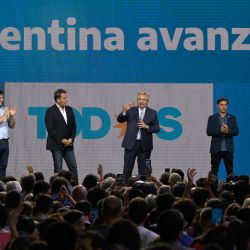
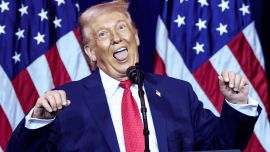


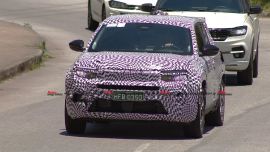



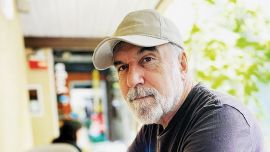
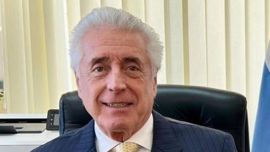



Comments